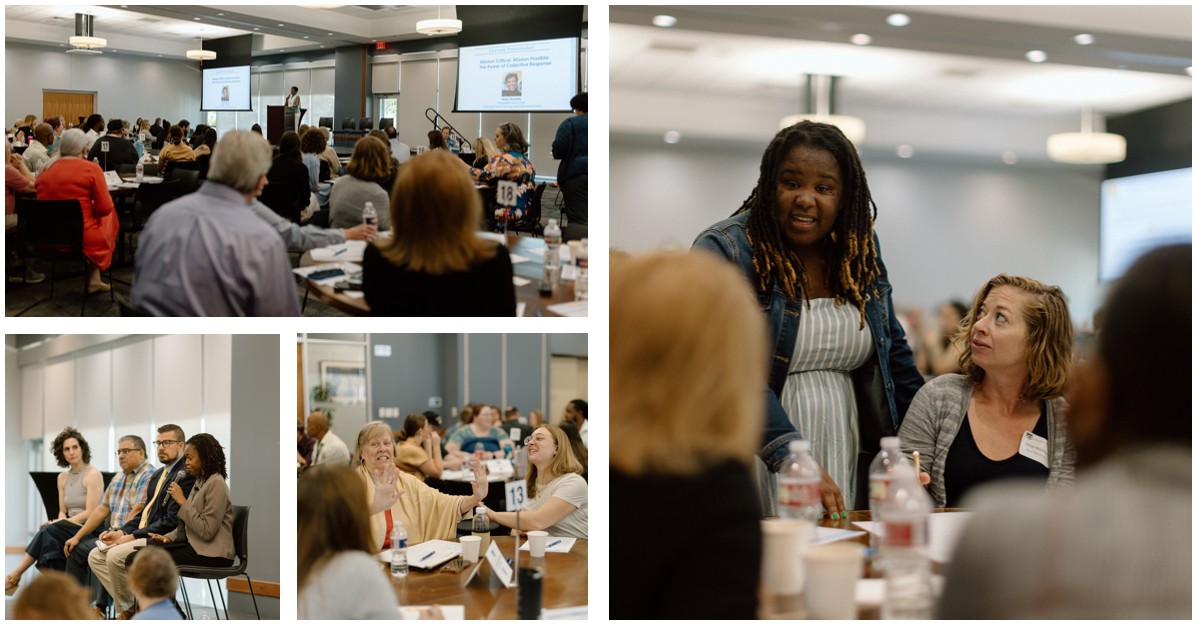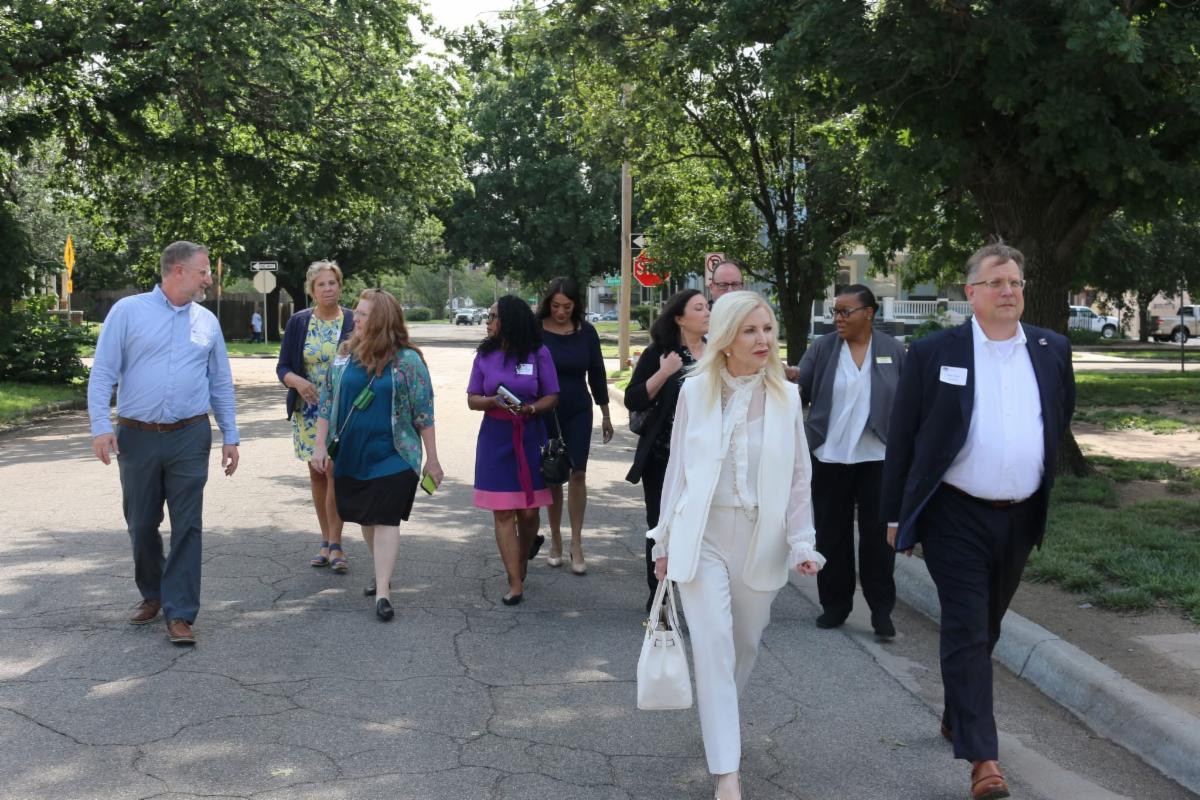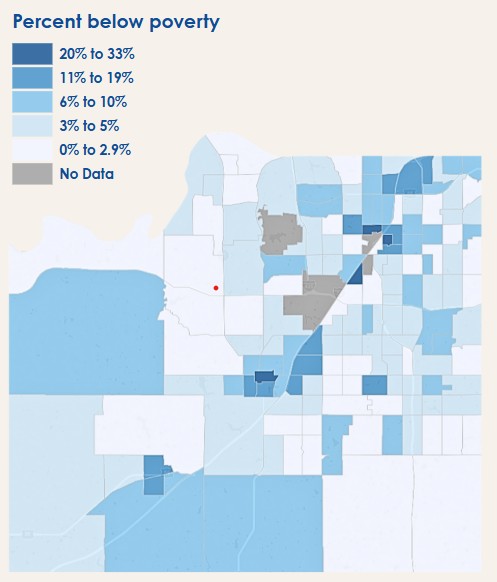2025 Human Service Summit Lays the Foundation for Collective Impact

On June 10, 2025, United Community Services of Johnson County (UCS) hosted the 2025 Human Service Summit. This event brought together cross-sector leaders to navigate growing uncertainty and promote coordinated responses to recent policy disruptions. With over 100 attendees from nonprofits, public agencies, and local government, the event focused on understanding the impacts of executive orders, identifying solutions, and building resilience through collaboration.
The morning opened with remarks from UCS Executive Director Kristy Baughman, followed by a legal level-setting panel featuring Monica Bennett (ACLU), Casey Johnson (Kansas Legal Services), and Eusebio Diaz (Health Forward Foundation), moderated by UCS’s Christina Ashie Guidry. Panelists explained the legal standing of executive orders, the ongoing litigation, and affirmed that many existing civil rights protections remain intact. Attendees were encouraged to continue mission-aligned work, conduct internal risk assessments, and communicate clearly with staff, funders, and clients.
Keynote speaker Mary Ricketts, President and CEO of Turning Point Training and Development inspired attendees to remain mission-focused in times of change, and later facilitated the sector-based table discussions. These discussions produced rich insights into shared challenges and actionable next steps across different sectors, including housing, healthcare, youth services, local government, and advocacy.
A clear theme emerged from the table work: executive orders have intensified funding cuts, reduced service access, and heightened uncertainty, particularly for vulnerable populations. Participants emphasized the need for coordinated advocacy, strengthened data and storytelling, and sustained cross-sector collaboration. Concrete next steps identified by sectors included convening food providers, mapping housing networks, launching narrative change efforts, and expanding Medicaid navigation partnerships.
The summit concluded with a call to action from UCS: continue working together, use data and stories strategically, and lean on UCS for support in convening, policy guidance, and advocacy tools.
UCS and the Kansas Housing Advocacy Network Connect with Wichita Leaders

In partnership with UCS and the Kansas Housing Advocacy Network (KHAN), HumanKind Ministries and the Coalition to End Homelessness of Wichita/Sedgwick County hosted a Lunch & Learn Tour of Wichita’s Housing Services Ecosystem for elected officials on Wednesday, June 18th. State legislators, candidates for office, and representatives of local government made for a packed room.
Shylee Ziad, CoC Planning Associate with United Way of the Plains, shared: “Our recent Legislative Lunch & Learn was a powerful and encouraging event that created space to highlight both the strengths of our community’s response to homelessness and the areas where increased legislative support is still critically needed. What made the event especially impactful was the intentional inclusion of lived experience voices throughout the day—from greeters at check-in, to tour hosts, to participants in the dessert session. Their presence and leadership hopefully grounded the conversation in real stories and helped legislators connect more deeply with the realities behind the issues.”
The event started with guided tours of HumanKind Ministries, Breakthrough Episcopal Social Services, and Second Light (formerly known as the Multi-Agency Center or MAC). Participants also heard from United Way of the Plains and United Methodist Open Door. The powerful takeaway from these tours is collaboration and coordination. Together, these agencies coordinate to provide wrap-around and intensive services in addition to stable housing to support over 3,250 residents experiencing homelessness in 2024. Services include street outreach, case management, health and mental health care, food, job and financial management training, low-barrier shelter, intermediate and long-term affordable housing. These partners of the Coalition to End Homelessness of Wichita/Sedgwick County – the Continuum of Care for the region – also work closely with the police department to divert residents experiencing homelessness out of the justice involvement and into supportive services.
Unfortunately, the region is missing about 24,000 rental units and 35,000 homes, according to the February 2025 report by Wichita State University on the Economic Impact of Homelessness and Housing Needs Assessment. Without adequate affordable housing, clients who are otherwise stable and have income get stuck using shelter or supported housing space because they cannot find an affordable place to live.
During lunch, Christina Ashie Guidry, Director of Policy & Planning at UCS, affirmed that rapidly increasing housing prices, inflation, and stagnant wages have led to Sedgwick County residents feeling the effects of its housing shortage. Housing is unaffordable for about 45% of Sedgwick County renters and 36% of homeowners, which is pushing an increasing number of Sedgwick residents, like retirees on fixed incomes, into homelessness. The CoC has seen a 220% increase in unsheltered homelessness in the past five years. The February 2025 report by WSU underscores that to “adequate affordable and safe housing [is] the priority component for homelessness solutions.”
The solution to the housing shortage and increased homelessness has three parts:
- Addressing housing supply,
- Acting upstream to prevent cost-burdened households from becoming homeless,
- Providing adequate support for collaborative efforts to provide housing plus services for residents experiencing homelessness.
Addressing housing supply by expanding property rights and adapting zoning to allow for greater housing density and variability will allow the private market to better address the housing shortage. For example, Arkansas just made accessory dwelling units, also known as “granny flats” or “in-law suites”, permissible by right across the state without additional requirements like parking minimums; Oklahoma City has done the same. Meanwhile, rental registration, licensing, and inspection programs help ensure that existing housing is safe and habitable. Finally, providing a mix of state and municipal incentives for affordable housing will allow for sustainable economic growth.
To address the growing number of residents experiencing homelessness, the next step and vision for the community is the full realization of Second Light, which will expand provider capacity to address the underlying need in the community for additional shelter and long-term affordable housing along with wrap around services from health to job training to case workers on-site and in direct proximity to other critical service providers.
Cole Schneiders, CoC Planning Manager noted, “Homelessness is an issue that can only be solved when the whole community comes together – and that means our leaders at all level of government, who showed up for their most vulnerable constituents today.”
Many thanks to: Rep. Leah Howell, Rep. Cyndi Howerton, Rep. Tom Kessler, Rep. Angela Martinez, and Rep. Brian Bergkamp for their active engagement at this event.
UCS Releases new Fact Sheet on Poverty in Johnson County Cities
More than 32,000 Johnson County residents—approximately 6% of the population—live below the federal poverty level, with thousands more living just above it. Poverty exists throughout the county but is more concentrated in certain geographic areas such as the Northeast suburbs, Olathe, urban corridors along I-35, and rural towns like Edgerton and De Soto. Young adults aged 18–24 experience the highest poverty rates among all age groups in most major cities. City-level poverty rates vary widely, ranging from less than 1% in communities like Westwood Hills and Mission Woods to over 11% in Roeland Park and Gardner Township. See the full fact sheet here.

